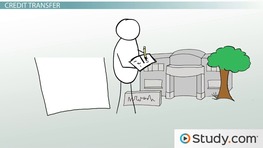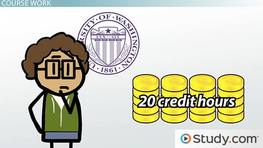Explore Student Support in Education
Courses and Lessons for Student Support
Student support programs are in place at all levels of education, from elementary school through college.
Explore our full library of student support in education courses:
High School 101: High School Readiness
College 101: College Readiness
Library Science 101: Information Literacy
How to Choose a Major: Guidance Counseling
How to Choose a College: Guidance Counseling
Explore our full library of student support in education courses:
What is Student Support?
Student Support Services, sometimes abbreviated as SSS, are services designed to ensure successful student participation in the school curriculum and community. Recognizing that academic learning can inhibit social struggles, physical needs, and psychological challenges, schools endeavor to address these needs using different group and individual intervention processes. Various individuals may provide student services within the school system. Guidance counselors, school nurses, school psychologists, social workers, and other professionals can be part of the team that works with teachers and administrators to support and instruct students.
At the elementary level, student support services often focus on student's social and emotional well-being. Services may include counseling, social skills groups, and anti-bullying training. Professionals may also work to ensure that students' physical needs are being met, connecting at-risk students with relevant social service agencies to address needs resulting from poverty or adverse home situations.
Student support services include college and career preparation at the middle and high school levels. Professionals may help students choose classes, prepare resumes, navigate college applications, or find internships. Student support at this level can include various skills training as well.
Student support services are required at the college level, including academic tutoring. Student support services can also address navigating the financial aid process, helping students find housing, mentoring, career counseling, and even cultural support.
Student support services at every level consist of a network of individuals working together to connect students, families, and the educational staff to enhance student participation in the learning process. Student support looks beyond the academic needs to determine how students can best be equipped for school success.





Student and Teacher Resources for Special Education
 |
We know it can be difficult to know where to start when it comes to learning more about special education. Academic support for students with differences in physical, mental, and learning abilities is a must, but focusing on students' social and emotional well-being are crucial as well. Whether you are a student transitioning to college wondering about the kind of accommodations you can expect and request, a parent/guardian looking to do all you can to support your child, or a teacher planning to create a more inclusive classroom, encouragement and advocacy is critical for future learning. We have several resources to help you understand supportive tools available to students, parents/guardians, and teachers:
Supportive Accommodations in the College Classroom: What Students Need to Know
Most students are on their own for the first time when they head off to college. All of the things you need to figure out can be overwhelming, and adding the need for accommodations can feel like too much. The good news is your school should have an office or center for accessible education - they'll be able to help you figure out what you need and give you all the information about how to get it. See below for some of the options available:
- Accommodations or Modifications: As in most school settings, colleges should be able to provide what you need in order to be successful in your classes. Most professors are open and willing to help you with what you need in order to pass their classes. Some accommodations you can request are note taking aids, turning in an assignment in a different format, or recording a professor's lecture. Modifications you can ask for are an alternate testing environment or asking for a smaller or differentiated assignment that still meet the standard of the course.
- Assistive Technology: This could apply in a variety of circumstances, depending on your needs. It can range from enlarged screens to read a text, using calculators, or using an assisted listening device. It is important to reach out and discuss with your professor or the school's disability services to see what you can use.
- Testing Accommodations: Finals and midterms are a necessary part of the college experience. Most students experience some kind of testing anxiety walking into a final or a midterm that they thoroughly prepared and studied for. Testing accommodations can be made for most testing situations, whether it is extra time or breaks, splitting the exam over a couple of days, or having the exam read aloud to you. It is vital that all communications are made early in the semester to get all support you made need to perform at your best.
Supportive Ways to Help Students with Learning Differences
We all know teachers are some of the hardest workers out there, making sure they are providing a positive and successful learning environment. Below are some options teachers can use to make sure that all students have access to the tools they need to be successful. As a parent/guardian, it can be incredibly helpful to understand these types of accommodations so you can make sure you have the knowledge and vocabulary to fight for what your child needs.
- Accommodations in the Classroom: When you receive a student's IEP or 504 plan, it can be a bit daunting at first. Depending on the support services at your school, there a couple of actions you can implement right away in your classroom, depending on the student and their goals. Some low lift accommodations you can do are extending time on tests, breaking down student classwork into chunks, or reading a test out loud to a student.
- Teaching Students Online: Many students may choose to do their learning online instead of in the classroom. As a teacher you maybe thinking how can I meet my students' needs virtually? A couple steps to keep in mind are extending the due date of completed assignments, providing notes to your students prior to teaching the lesson, as well as permitting any assistive technology they may require.
- Addressing Anxiety in the Classroom: Anxiety can present itself in different ways with students in the classroom. Being informed as an educator is important as well as a creating a safe place where all students can feel heard and validated. Some ways you can help students feel safe in your class are adjusting assignments for length or time, letting them know of any big assessments coming up, as well as keeping communication open with your students. Doing frequent check-ins and one-on-one meetings can show your students the highest level of support.